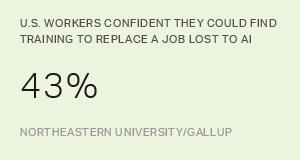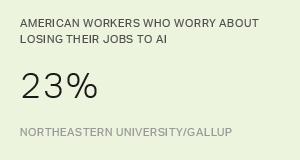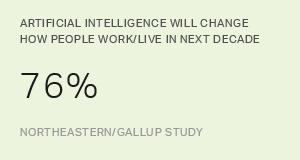Story Highlights
- 54% of Americans say they are unlikely to use self-driving cars
- 59% would be uncomfortable riding in self-driving cars
- 62% would be uncomfortable sharing the road with self-driving trucks
WASHINGTON, D.C. -- By some estimates, 10 million self-driving vehicles will be on the road worldwide by 2020, however, Americans are currently skeptical of using the technology. More than half of the U.S. public (54%) says it is not likely to use the vehicles.
| Likely (5, 4) | Unlikely (2, 1) | |||||||||||||||||||||||||||||||||||||||||||||||||||||||||||||||||||||||||||||||||||||||||||||||||||
|---|---|---|---|---|---|---|---|---|---|---|---|---|---|---|---|---|---|---|---|---|---|---|---|---|---|---|---|---|---|---|---|---|---|---|---|---|---|---|---|---|---|---|---|---|---|---|---|---|---|---|---|---|---|---|---|---|---|---|---|---|---|---|---|---|---|---|---|---|---|---|---|---|---|---|---|---|---|---|---|---|---|---|---|---|---|---|---|---|---|---|---|---|---|---|---|---|---|---|---|---|
| % | % | |||||||||||||||||||||||||||||||||||||||||||||||||||||||||||||||||||||||||||||||||||||||||||||||||||
| All Americans | 25 | 54 | ||||||||||||||||||||||||||||||||||||||||||||||||||||||||||||||||||||||||||||||||||||||||||||||||||
| Gender | ||||||||||||||||||||||||||||||||||||||||||||||||||||||||||||||||||||||||||||||||||||||||||||||||||||
| Men | 28 | 50 | ||||||||||||||||||||||||||||||||||||||||||||||||||||||||||||||||||||||||||||||||||||||||||||||||||
| Women | 22 | 58 | ||||||||||||||||||||||||||||||||||||||||||||||||||||||||||||||||||||||||||||||||||||||||||||||||||
| Age | ||||||||||||||||||||||||||||||||||||||||||||||||||||||||||||||||||||||||||||||||||||||||||||||||||||
| 18-35 | 36 | 41 | ||||||||||||||||||||||||||||||||||||||||||||||||||||||||||||||||||||||||||||||||||||||||||||||||||
| 36-50 | 29 | 49 | ||||||||||||||||||||||||||||||||||||||||||||||||||||||||||||||||||||||||||||||||||||||||||||||||||
| 51-65 | 19 | 61 | ||||||||||||||||||||||||||||||||||||||||||||||||||||||||||||||||||||||||||||||||||||||||||||||||||
| 66+ | 12 | 69 | ||||||||||||||||||||||||||||||||||||||||||||||||||||||||||||||||||||||||||||||||||||||||||||||||||
| Education | ||||||||||||||||||||||||||||||||||||||||||||||||||||||||||||||||||||||||||||||||||||||||||||||||||||
| Less than a bachelor's degree | 19 | 62 | ||||||||||||||||||||||||||||||||||||||||||||||||||||||||||||||||||||||||||||||||||||||||||||||||||
| Bachelor's degree or higher | 38 | 39 | ||||||||||||||||||||||||||||||||||||||||||||||||||||||||||||||||||||||||||||||||||||||||||||||||||
| Northeastern University/Â鶹´«Ã½AV survey, Sept. 15-Oct. 10, 2017 | ||||||||||||||||||||||||||||||||||||||||||||||||||||||||||||||||||||||||||||||||||||||||||||||||||||
These data come from a Northeastern University/Â鶹´«Ã½AV survey of Americans' attitudes toward artificial intelligence (AI) and its effect on their lives and work. The mail survey of 3,297 U.S. adults was conducted Sept. 15-Oct. 10, 2017.
Technology companies, automobile manufacturers and universities are all researching ways to develop cars that can drive themselves, using navigation software and elements of artificial intelligence to get people or goods to places they need to go. Testing is ongoing to ensure that self-driving cars can share the road safely with other vehicles, including those driven by people and other self-driving cars.
Although the majority of Americans have doubts about using self-driving cars, some are more ready to let technology take the wheel. The likelihood of a college graduate saying they are likely to use a self-driving car is twice as high as those without a college degree, 38% vs. 19%, respectively.
Additionally, the youngest American adults, those aged 18 to 35, are the most likely age group to say they would use self-driving cars, with 36% saying they are likely to do so. Likelihood to use the technology declines to 29% among those aged 36 to 50, 19% among those 51 to 65 and 12% for those 66 years of age or older.
Americans Uncomfortable With Riding in Self-Driving Cars
Americans are largely uncomfortable with the idea of riding in a self-driving car on a daily basis, as 59% rate their discomfort with this fairly high on a five-point scale. Less than a quarter (23%) place themselves at the other end of the scale, indicating they would be comfortable or extremely comfortable riding in such a car.
| Comfortable (5, 4) | Uncomfortable (2, 1) | |||||||||||||||||||||||||||||||||||||||||||||||||||||||||||||||||||||||||||||||||||||||||||||||||||
|---|---|---|---|---|---|---|---|---|---|---|---|---|---|---|---|---|---|---|---|---|---|---|---|---|---|---|---|---|---|---|---|---|---|---|---|---|---|---|---|---|---|---|---|---|---|---|---|---|---|---|---|---|---|---|---|---|---|---|---|---|---|---|---|---|---|---|---|---|---|---|---|---|---|---|---|---|---|---|---|---|---|---|---|---|---|---|---|---|---|---|---|---|---|---|---|---|---|---|---|---|
| % | % | |||||||||||||||||||||||||||||||||||||||||||||||||||||||||||||||||||||||||||||||||||||||||||||||||||
| All Americans | 23 | 59 | ||||||||||||||||||||||||||||||||||||||||||||||||||||||||||||||||||||||||||||||||||||||||||||||||||
| Gender | ||||||||||||||||||||||||||||||||||||||||||||||||||||||||||||||||||||||||||||||||||||||||||||||||||||
| Men | 28 | 53 | ||||||||||||||||||||||||||||||||||||||||||||||||||||||||||||||||||||||||||||||||||||||||||||||||||
| Women | 19 | 64 | ||||||||||||||||||||||||||||||||||||||||||||||||||||||||||||||||||||||||||||||||||||||||||||||||||
| Age | ||||||||||||||||||||||||||||||||||||||||||||||||||||||||||||||||||||||||||||||||||||||||||||||||||||
| 18-35 | 33 | 50 | ||||||||||||||||||||||||||||||||||||||||||||||||||||||||||||||||||||||||||||||||||||||||||||||||||
| 36-50 | 27 | 55 | ||||||||||||||||||||||||||||||||||||||||||||||||||||||||||||||||||||||||||||||||||||||||||||||||||
| 51-65 | 17 | 63 | ||||||||||||||||||||||||||||||||||||||||||||||||||||||||||||||||||||||||||||||||||||||||||||||||||
| 66+ | 14 | 67 | ||||||||||||||||||||||||||||||||||||||||||||||||||||||||||||||||||||||||||||||||||||||||||||||||||
| Education | ||||||||||||||||||||||||||||||||||||||||||||||||||||||||||||||||||||||||||||||||||||||||||||||||||||
| Less than a bachelor's degree | 18 | 65 | ||||||||||||||||||||||||||||||||||||||||||||||||||||||||||||||||||||||||||||||||||||||||||||||||||
| Bachelor's degree or higher | 33 | 45 | ||||||||||||||||||||||||||||||||||||||||||||||||||||||||||||||||||||||||||||||||||||||||||||||||||
| Northeastern University/Â鶹´«Ã½AV survey, Sept. 15-Oct. 10, 2017 | ||||||||||||||||||||||||||||||||||||||||||||||||||||||||||||||||||||||||||||||||||||||||||||||||||||
As with their willingness to use self-driving cars themselves, those with higher levels of education and younger Americans are most likely to say they would be comfortable being a regular passenger in a self-driving car.
Little Comfort Sharing the Road With Self-Driving Trucks
Whether they personally use or ride in self-driving cars, Americans are almost certainly going to confront autonomous trucks on the highways in the future. Many companies invested more than $1 billion in 2017 alone into the development of self-driving trucks. The development of self-driving trucks is viewed as posing less difficulty than self-driving cars because of their primary use on open stretches of road, and the trucking industry is seen as primed for automation.
Americans are no more comfortable with autonomous trucks than they are with riding in self-driving vehicles themselves. More than six in 10 U.S. adults (62%) indicate they would be extremely uncomfortable or uncomfortable sharing the road with self-driving trucks, compared with 20% who would be extremely comfortable or comfortable doing so.
| Comfortable (5, 4) | Uncomfortable (2, 1) | |||||||||||||||||||||||||||||||||||||||||||||||||||||||||||||||||||||||||||||||||||||||||||||||||||
|---|---|---|---|---|---|---|---|---|---|---|---|---|---|---|---|---|---|---|---|---|---|---|---|---|---|---|---|---|---|---|---|---|---|---|---|---|---|---|---|---|---|---|---|---|---|---|---|---|---|---|---|---|---|---|---|---|---|---|---|---|---|---|---|---|---|---|---|---|---|---|---|---|---|---|---|---|---|---|---|---|---|---|---|---|---|---|---|---|---|---|---|---|---|---|---|---|---|---|---|---|
| % | % | |||||||||||||||||||||||||||||||||||||||||||||||||||||||||||||||||||||||||||||||||||||||||||||||||||
| All Americans | 20 | 62 | ||||||||||||||||||||||||||||||||||||||||||||||||||||||||||||||||||||||||||||||||||||||||||||||||||
| Gender | ||||||||||||||||||||||||||||||||||||||||||||||||||||||||||||||||||||||||||||||||||||||||||||||||||||
| Men | 28 | 54 | ||||||||||||||||||||||||||||||||||||||||||||||||||||||||||||||||||||||||||||||||||||||||||||||||||
| Women | 14 | 68 | ||||||||||||||||||||||||||||||||||||||||||||||||||||||||||||||||||||||||||||||||||||||||||||||||||
| Age | ||||||||||||||||||||||||||||||||||||||||||||||||||||||||||||||||||||||||||||||||||||||||||||||||||||
| 18-35 | 30 | 49 | ||||||||||||||||||||||||||||||||||||||||||||||||||||||||||||||||||||||||||||||||||||||||||||||||||
| 36-50 | 23 | 59 | ||||||||||||||||||||||||||||||||||||||||||||||||||||||||||||||||||||||||||||||||||||||||||||||||||
| 51-65 | 15 | 69 | ||||||||||||||||||||||||||||||||||||||||||||||||||||||||||||||||||||||||||||||||||||||||||||||||||
| 66+ | 12 | 72 | ||||||||||||||||||||||||||||||||||||||||||||||||||||||||||||||||||||||||||||||||||||||||||||||||||
| Education | ||||||||||||||||||||||||||||||||||||||||||||||||||||||||||||||||||||||||||||||||||||||||||||||||||||
| Less than a bachelor's degree | 16 | 69 | ||||||||||||||||||||||||||||||||||||||||||||||||||||||||||||||||||||||||||||||||||||||||||||||||||
| Bachelor's degree or higher | 30 | 48 | ||||||||||||||||||||||||||||||||||||||||||||||||||||||||||||||||||||||||||||||||||||||||||||||||||
| Northeastern University/Â鶹´«Ã½AV survey, Sept. 15-Oct. 10, 2017 | ||||||||||||||||||||||||||||||||||||||||||||||||||||||||||||||||||||||||||||||||||||||||||||||||||||
Again, the youngest adults and those with the highest levels of education are among the most likely to be comfortable sharing the road with self-driving trucks.
Also, men are twice as likely as women to say they would be comfortable sharing the road with self-driving trucks, 28% vs. 14%.
Bottom Line
Self-driving cars are often seen as the next evolution in driving. However, Americans are deeply apprehensive. Overcoming this apprehension about the safety of the vehicles will likely encourage Americans to adopt self-driving cars and accept them on the road.
The vanguard of adoption and acceptance of self-driving vehicles in the U.S. is likely to be among those with the highest levels of education and the youngest adults. Americans with a bachelor's degree or higher are among the most optimistic about the impact of the adoption of artificial intelligence and this optimism may be reflected in their higher levels of comfort with and willingness to use self-driving cars. Younger Americans may simply be more comfortable with self-driving cars because of their potentially higher levels of comfort with new technology in general.
Americans have previously underestimated their potential adoption of new technology. Nearly a quarter (23%) of U.S. adults said they would never get a cellphone in Â鶹´«Ã½AV's survey on the issue in 2000. In the decade and a half since, cellphones have become virtually ubiquitous. It is possible a similar pattern of adoption of self-driving vehicles may also occur.
Read the full Northeastern/Â鶹´«Ã½AV report "Optimism and Anxiety: Views on the Impact of Artificial Intelligence and Higher Education's Response."
Survey Methods
Results for the Northeastern University-Â鶹´«Ã½AV survey on artificial intelligence are based on surveys conducted by mail from Sept. 15 to Oct. 10, 2017, with a random sample of 3,297 U.S. adults aged 18 and older. The survey package included an English and a Spanish survey to provide respondents with the flexibility to reply in their preferred language.
Â鶹´«Ã½AV selected the sample of U.S. residents using address-based sampling (ABS), a sampling technique used to select households from a list of all households on file with the United States Postal Service (USPS). Â鶹´«Ã½AV chooses respondents within the household at random based on which household member would have the next birthday. Â鶹´«Ã½AV used a series of postcard reminders to encourage participation in the survey.
Â鶹´«Ã½AV weighted the data to match national demographics of gender, age, race, Hispanic ethnicity, education and region.
All reported margins of sampling error include the computed design effects for weighting.
For results based on the total sample of 3,297 U.S. adults, the margin of sampling error is ±2 percentage points at the 95% confidence level.





